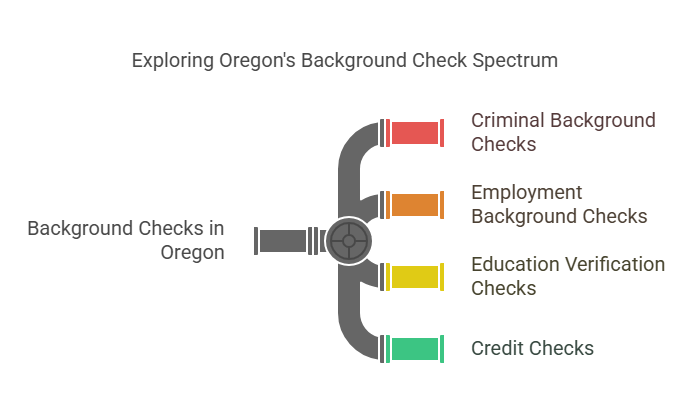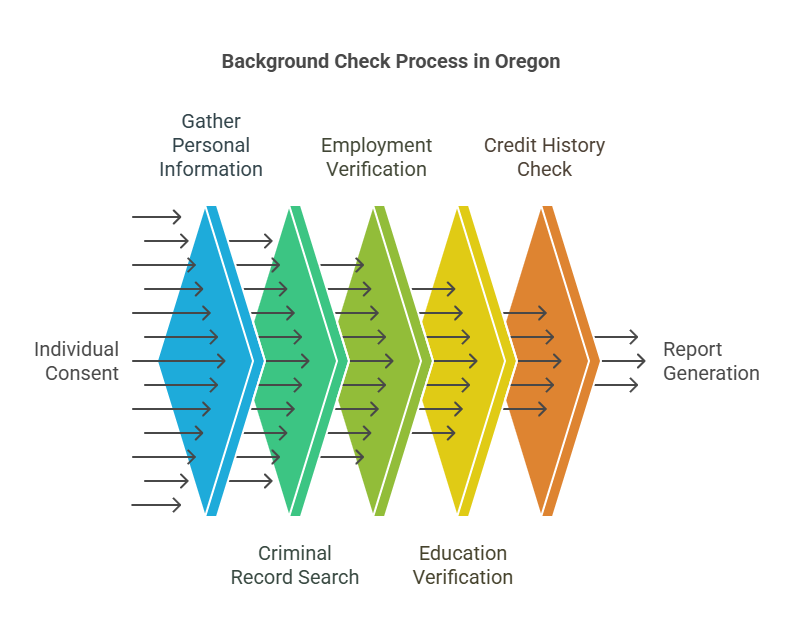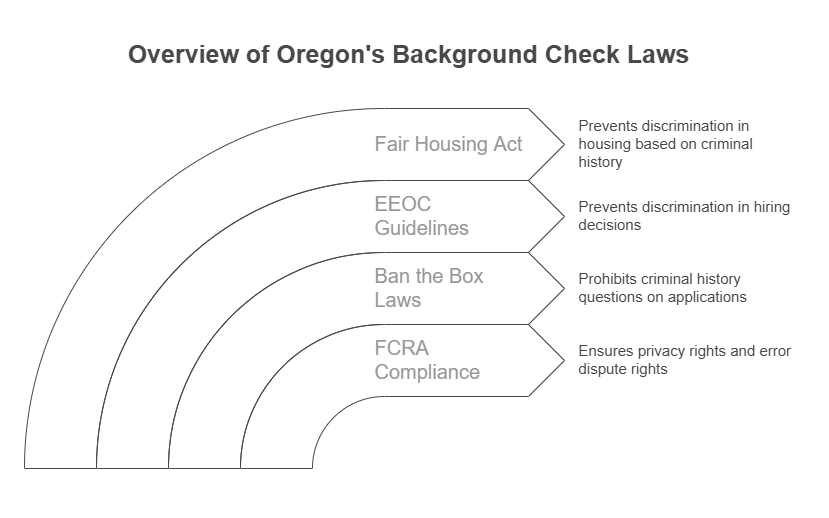Understanding the Importance of Background Checks in Oregon

What is a Background Check in Oregon?
A background check in Oregon refers to the process of investigating an individual’s personal, professional, and criminal history to assess their suitability for specific roles, responsibilities, or housing arrangements. Background checks are conducted for various purposes, including employment, renting property, and ensuring public safety. In Oregon, these checks are a critical tool for employers, landlords, and government agencies to ensure they are making informed decisions.
The need for background checks in Oregon has grown over the years, particularly with the increasing concerns around safety, security, and fairness. These checks help verify the accuracy of a person’s history, ensuring they are trustworthy and qualified for the tasks they are hired or trusted for.
Types of Background Checks in Oregon

In Oregon, several types of background checks are commonly performed, including:
- Criminal Background Checks: These checks reveal any criminal convictions, arrests, or ongoing criminal cases. Employers, landlords, and government agencies rely on criminal checks to assess the risk of hiring or renting to someone with a criminal history.
- Employment Background Checks: These checks often include a review of a person’s employment history, education credentials, and professional qualifications. They are commonly used by employers to verify that candidates have the necessary experience and qualifications for the position.
- Education Verification Checks: Education checks verify the accuracy of a person’s claimed academic qualifications. These are often used by employers when hiring for positions that require specific degrees or certifications.
- Credit Checks: In Oregon, credit checks are typically performed for positions involving financial responsibilities, such as banking or management roles. Landlords may also use credit checks to evaluate a tenant’s ability to pay rent reliably.
Who Conducts Background Checks in Oregon?
Several entities conduct background checks in Oregon, each for different purposes:
- Employers: Companies use background checks to evaluate job applicants or employees, ensuring they meet the qualifications and have no concerning criminal history. Certain industries, such as healthcare, finance, and education, are more likely to require extensive checks due to their sensitive nature.
- Landlords: Property owners or rental agencies often conduct background checks on prospective tenants to confirm their ability to pay rent, verify their rental history, and ensure they do not have a criminal record that could endanger the safety of other tenants.
- Government Agencies: Various government bodies in Oregon, such as the Oregon State Police or local authorities, may perform background checks for individuals applying for positions involving public trust or security clearances. Additionally, law enforcement agencies may conduct background checks as part of investigations.
Background Check Requirements in Oregon vs. Other States
Background check laws can differ significantly from state to state, and Oregon has several distinctive rules that set it apart from other regions. For instance:
- Ban the Box Laws: Oregon has Ban the Box laws, which prohibit employers from asking about an applicant’s criminal history on the initial job application. This helps prevent discrimination against individuals with criminal records early in the hiring process. Other states, like California and Hawaii, also have similar laws, but Oregon’s Ban the Box policy applies both to public and private employers.
- Expungement of Criminal Records: Oregon has a system for expunging certain criminal convictions, meaning they are sealed and no longer show up on most background checks after a set period. This differs from states like Florida, where expungements are more limited.
- Fair Housing Laws: In Oregon, the Fair Housing Act provides specific protections for tenants against discrimination based on criminal records. Landlords must ensure that they follow proper guidelines when considering an applicant’s criminal history, just like employers following EEOC guidelines for hiring.
- Use of Credit Reports: Oregon restricts the use of credit reports for employment purposes more heavily than some other states. For example, employers cannot request a credit report for most jobs unless the role involves financial responsibilities.
The Step-by-Step Process for Conducting a Background Check in Oregon

A typical background check in Oregon involves several steps, depending on the type of check being performed:
- Permission and Consent: Before conducting any background check, the individual being investigated must provide written consent. This consent is required by FCRA (Fair Credit Reporting Act) to ensure transparency and fairness in the process.
- Gathering Personal Information: To initiate a background check, the individual must provide personal details, including their full name, date of birth, Social Security number, and addresses over the past few years. This information helps to locate accurate records.
- Criminal Record Search: The criminal background check will search for any felonies, misdemeanors, arrests, or ongoing investigations. The search typically includes federal, state, and local records. In Oregon, the Oregon State Police is a primary source for criminal background data.
- Employment and Education Verification: Employers and education institutions may be contacted to verify the applicant’s previous employment history and academic qualifications. This process can be time-consuming depending on the responsiveness of the institutions involved.
- Credit History Check: In certain circumstances, a credit check will be conducted to assess the financial reliability of an individual. This is especially common for positions that involve managing finances or sensitive financial data.
- Report Generation: Once all the data has been collected and verified, a report is generated detailing the findings. This report is shared with the requesting party (employer, landlord, or agency), who will then make decisions based on the information.
Benefits of Background Checks in Oregon
Background checks provide numerous benefits to those conducting them, including:
- Ensuring Safety: For employers, landlords, and government agencies, background checks help ensure the safety of others by screening out individuals who may pose a risk due to past criminal activity or poor financial habits.
- Mitigating Liability: Employers and landlords mitigate the risk of legal action by conducting proper background checks. By verifying the information on a person’s application, these parties reduce the chances of hiring or renting to someone who could harm the business, community, or property.
- Verifying Qualifications: Background checks also help verify an applicant’s qualifications for the position or rental. This ensures that applicants possess the necessary experience, education, and financial reliability for the role or housing.
- Building Trust: Employers and landlords can build trust with their employees or tenants by using background checks as part of a fair and thorough vetting process. It provides assurance that they are making responsible decisions.
Who Typically Requests Background Checks in Oregon?
In Oregon, a range of individuals and entities request background checks:
- Employers: Companies across various sectors (e.g., healthcare, education, finance) conduct background checks on potential hires to ensure they meet the criteria for safety and qualifications.
- Landlords and Property Managers: Rental property owners and managers perform background checks to screen potential tenants and ensure they are financially reliable and do not pose a security risk.
- Government Agencies: Agencies may require background checks for applicants seeking positions involving sensitive information or security clearances, such as those working in law enforcement or healthcare.
Exact Background Checks: Professional Screening Solutions
For those seeking reliable, timely, and compliant background checks in Oregon, Exact Background Checks offers a comprehensive service for employers, landlords, and organizations. By partnering with Exact Background Checks, you can streamline your background screening process while ensuring accuracy and compliance with both state and federal laws.
Legal Aspects of Background Checks in Oregon

In Oregon, several legal aspects govern background checks, ensuring that they are conducted fairly and lawfully:
- FCRA Compliance: As mentioned earlier, the Fair Credit Reporting Act (FCRA) regulates how background checks are conducted and ensures that individuals’ privacy rights are upheld. The FCRA mandates that individuals must be informed about background checks before they are performed, and that they have the right to dispute any errors found in the report.
- Ban the Box Laws: Oregon’s Ban the Box law prohibits employers from asking about an applicant’s criminal history on job applications. This law ensures that individuals with criminal histories have a fair chance to be evaluated based on their qualifications before their criminal past is considered.
- EEOC Guidelines: Employers in Oregon must follow the Equal Employment Opportunity Commission (EEOC) guidelines when using criminal background checks in hiring decisions. These guidelines help prevent discrimination based on race, ethnicity, or other protected characteristics.
- Fair Housing Act: Under Oregon’s Fair Housing Act, landlords must ensure they are not discriminating against tenants based on criminal history unless the history poses a direct threat to others’ safety. Additionally, landlords are restricted from using criminal records to automatically disqualify applicants.
FAQs About Background Checks in Oregon
What types of background checks are commonly conducted in Oregon?
- In Oregon, common background checks include criminal background checks (to reveal criminal convictions), employment background checks (to verify work history and qualifications), education verification checks (to confirm academic credentials), and credit checks (for positions involving financial responsibilities or by landlords).
How does Oregon's "Ban the Box" law differ from other states?
- Oregon's "Ban the Box" law prohibits employers from asking about an applicant’s criminal history on the initial job application, applying to both public and private employers. This feature is more encompassing than some other states that may only apply the law to public sector employers.
What steps are involved in conducting a typical background check in Oregon?
- A typical background check in Oregon involves obtaining written consent from the individual, gathering personal information, conducting a criminal record search, verifying employment and education history, performing a credit history check (if applicable), and generating a report with the findings.
What legal aspects govern background checks in Oregon?
- Background checks in Oregon are governed by several legal aspects, including compliance with the Fair Credit Reporting Act (FCRA), Oregon’s Ban the Box laws, Equal Employment Opportunity Commission (EEOC) guidelines, and the Fair Housing Act.
Why are background checks beneficial in Oregon?
- Background checks in Oregon are beneficial for ensuring safety by screening out potentially risky individuals, mitigating liability for employers and landlords, verifying qualifications to ensure applicants are suitable, and building trust through a fair and thorough vetting process.
Conclusion
Understanding how background checks in Oregon work is essential for both employers and individuals. By adhering to legal guidelines and considering the benefits of these checks, organizations can ensure they are making responsible decisions that help maintain safety and trust. Whether you’re an employer, landlord, or government agency, following the right procedures and using professional services like Exact Background Checks ensures compliance with state and federal laws while making informed, fair decisions.



